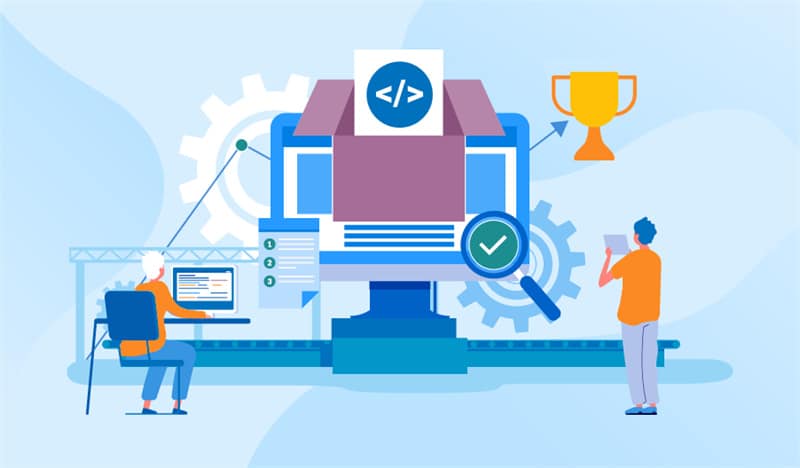
Explore proven marketing strategies to exponentially grow your user base for your AI app. From influencer partnerships to data-driven campaigns, find out everything here!
Artificial intelligence has been adopted by businesses in every niche, such as manufacturing, finance and health. Every business wants to incorporate the use of AI into their marketing efforts, HR, administrative automation and many more. Over 50% of businesses plan to explore AI to boost their operations in 2023.
Developers creating new AI apps must market their products the right way to showcase their innovations to tech businesses. Strategically demonstrating how custom AI apps can enhance productivity, decision-making, and customer engagement for businesses can convey the apps' value.
Here, we have curated some of the most effective marketing tactics to drive user adoption of AI applications. Applying these methods can help position your AI solution as a leading choice in the market.
The best artificial intelligence apps will always attract users through word-of-mouth and advocacy. With strategic promotion, your innovative AI application can become the platform of choice for many customers.
Use These Marketing Tactics to Become One of the Best Artificial Intelligence Apps
Below are some of the marketing strategies that should be applied to drive users for an AI app in the current competitive market:
1. Understanding the Business’s Needs

The first step to market an AI app is to understand the client's needs and pain points. This will ensure that the AI app is going to align with their marketing needs.
- Conduct market research to identify target customers, their pain points, and how your AI app can address them.
- Determine resources available for marketing activities. Try leveraging both paid and organic marketing tactics.
- Outline multimedia marketing plans across channels like social media, SEO, email and paid ads. Create campaigns that speak to specific user segments and their journey with your app.
2. Harnessing the Power of Social Media
Social media platforms such as Facebook and Instagram should be a focal point of any marketing strategy for artificial intelligence applications. Some effective tactics include:
- Companies can develop demonstrations, video testimonials, and use cases that highlight benefits.
- Creating infographics and presenting metrics that can measure how the AI improves key productivity, efficiency, and accuracy.
- Identifying key influencers and technology reviewers within the target industry. Providing access for these individuals to trial the AI application and endorse it to their audiences.
A strategic presence on relevant social platforms allows companies to showcase AI capabilities while nurturing engagement from prospective customers.
3. Optimize Apps for Discoverability
With over 5 million apps across Google Play Store and Apple Store, optimizing your listings is imperative for visibility. Reviews show that by leveraging keywords, users can boost app store search rankings. Best practices include:
- Incorporating relevant keywords into your title, subtitle, and descriptions based on buyer search behavior.
- Crafting a clear, compelling description highlighting your AI capabilities and customer benefits.
- Choosing categories and metadata aligned with your solution.
- Featuring visuals like screenshots and videos that showcase your AI and user experience.
4. Leverage AI Thought Leadership
Positioning your company and experts as authorities on AI builds trust and nurtures an audience highly engaged with AI trends. What AI businesses can do is:
- Publish articles, analyses, and videos explaining developments in AI techniques, applications, and implications.
- Speak at high-profile industry events about your vision for AI innovation and ethical development practices.
- Participate in standard bodies, academic programs, and policy discussions advancing the field.
Thought leadership builds credibility while also nurturing the target audience for top-of-mind awareness.
5. Prioritize SEO
With Google's dominance in most markets, search engine optimization is vital for discovery. One study found that 90% of B2B buyers use search engines to research solutions. Key activities include:
- Conducting keyword research to identify terms prospective users are searching for when exploring AI solutions.
- Producing optimized content (e.g., blogs, guides, FAQs) that rank highly for those keywords.
- Earning backlinks from authoritative publications related to your industry and technology focus area.
High search visibility and rankings for your AI content will drive more qualified traffic to your site.
6. Testing the Product

Testing is a critical component of any marketing strategy for artificial intelligence applications. Thorough testing provides the insights needed to optimize promotional tactics and demonstrate the unique value of AI products. Continuous testing is a great marketing tactic because it allows:
- Refining ideal buyer personas.
- Identifying UX improvements to boost adoption and retention.
- Selecting the optimal content formats, topics and call-to-action (CTAs).
- Evaluating the ROI of marketing expenditures to allocate budget.
7. Offer Free Trials
Allowing potential users to experience an AI app first-hand is crucial for driving adoption and buy-in. According to studies, free trials can improve conversion rates substantially. Some best practices include:
- Providing access to key features so prospects can evaluate the AI's capabilities before committing.
- For enterprise solutions requiring heavy integration, provide white-glove onboarding assistance.
- Structure seamless in-app upgrade options from free trial plans to paid tiers. Minimize friction in that transition.
The goal is to turn product explorers into devoted customers by creating positive trial experiences. Artificial intelligence development services specialists can provide valuable support in crafting the right trials.
8. Create an AI Advisory Board
Forming an advisory board of AI experts and industry leaders can lend an air of credibility while providing guidance. Here is how:
- Recruit academics, customers, researchers, and other specialists to join the board. Look for respected voices in the field.
- Engage the board quarterly to assess product strategy and market fit. Tap into their experience.
- Promote board members as trusted advisors shaping the AI's advancement. Let their pedigree reassure customers.
This demonstrates a commitment to cutting-edge AI practices beyond just marketing claims. To prove that your AI app obeys all ethical norms, employ an AI advisory board.
Final Thoughts
It takes calculated marketing strategies to make people aware of a new AI app in the market. The marketing tactics presented in this article can help effectively demonstrate the distinct capabilities and benefits of a new artificial intelligence application. All artificial intelligence development services specialists have expertise in running targeted campaigns for businesses.
With the right marketing plan highlighting real-world benefits, an innovative AI application can become the platform users choose to transform their business.










